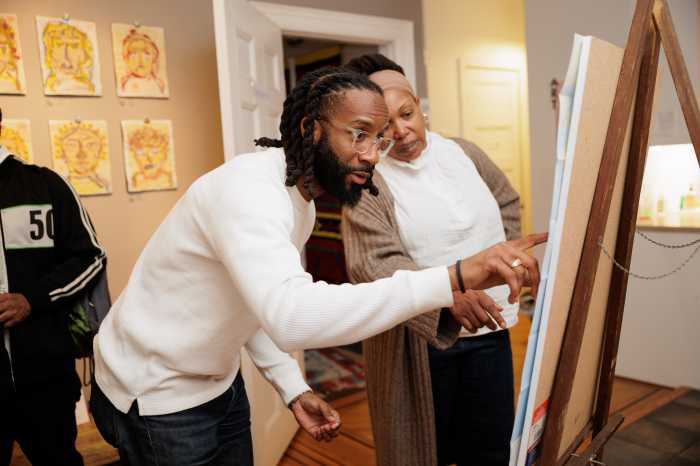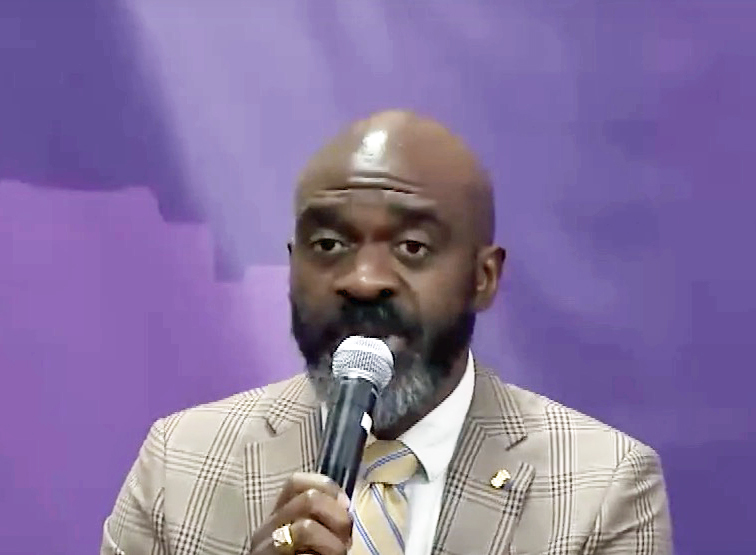Demond Mullins, a 24-year-old Iraq War
veteran living in Prospect Heights, recommends everyone – especially
those young people considering joining the military as a way
to finance their college educations – check out the powerful
new documentary, "The Ground Truth."
Scheduled for DVD release by Universal Studios on Sept. 26 following
a brief theatrical run in select cities, this documentary by
social activist-filmmaker Patricia Foulkrod offers an unflinching
look at the controversial, U.S.-led war in Iraq from the point
of view of several men and women who fought in it, then returned
home with horrifying physical injuries or deep emotional scars,
only to find what they describe as inadequate programs in place
to help them recover.
Veterans interviewed for the film recount how they willingly
signed up for the military because they wanted to serve their
country or find a fulfilling career and a path to a better life.
However, most also say they became disillusioned with their choice,
because they felt there was no clear purpose for their work in
Iraq.
Pointing out how they were constantly in danger because there
are no designated "front lines" in this war, and because
it is hard to separate their foes from innocent bystanders, other
survivors express grief over unnecessary civilian deaths or describe
an inability to deal with problems at home rationally and peacefully
after they were trained to dehumanize and eliminate their enemies
overseas.
Several soldiers speak of singing cadences about gunning down
children and reveal how they refer to their targets as "rag-heads"
and "bin Ladens" during training. They also allege
the military fails to address the psychological impact that killing
people has on its soldiers and say it downplays the actual bloody
business of war by using euphemisms and game-like weapon simulators
to emotionally distance the soldiers from the people they are
trained to annihilate.
The film also features confessions from vets who say they are
afraid to tell their loved ones what they are going through when
they come home for fear of disappointing those who consider them
heroes.
A soldier’s testimony
Mullins is one of the soldiers who describe on camera the impact
his experiences in Iraq have had on his civilian life.
"I think all Americans should check the film out and find
out what the soldiers are experiencing and find out what is going
on in Iraq and find out what could possibly happen to individuals
who join the military," Mullins told GO Brooklyn in a recent
phone interview.
Having signed up as a means of financing his own college education
through the G.I. Bill, Mullins served five years in the U.S.
Army National Guard and was deployed to Iraq in 2004.
"I didn’t join the active duty," Mullins says in the
documentary. "I joined the National Guard and my recruiter
told me I would be stateside. He said, ’The National Guard doesn’t
get deployed. You will receive the college benefits; the only
thing that would happen is, if there is a riot, then you would
be deployed.’ "
The veteran says he ended up going on about 150 combat missions
in Iraq, most of which "had no purpose."
"You’re so compromised," he says in the documentary.
"You drive on one block and children are playing football
and people are laughing and screaming: ’America! America!’ And
on the very next block, you’ll be shot at and blown up."
Upon returning home after a year of combat, Mullins says he suffered
feelings of rage and depression. A moment when he nearly punched
out the car window of a driver who cut him off on the expressway
served as a wakeup call that he needed some help. However, he
says seeing a psychologist at a Veterans Administration hospital
proved ineffective.
Although Mullins says he wasn’t suicidal, he admits in the film:
"I would think that I would die any way; that I would walk
outside and get hit by a bus just because I had been through
so much. Death couldn’t be far away."
Mullins says speaking to men and women dealing with similar emotions
and sharing his own experiences through the activist group, Iraq
Veterans Against the War, helped to alleviate some of the pain.
Now in his senior year at Lehman College in the Bronx, Mullins
has completed his service with the National Guard and is applying
to graduate programs with the hopes of pursuing a career in academia.
He also plans to continue spreading the word about a topic that
concerns so many yet is so seldom discussed.
"I hope that the film will increase American civilian awareness
of our experiences in Iraq and also increase their concern and,
thereby, increase their activity with the administration, as
far as voting goes, with the congressional elections coming up,"
says Mullins.
A better life?
The former soldier says he thinks people will be shocked to see
how different war-time military life actually is compared to
the adventurous existence the government sells in its TV commercials
and print advertisements or the way it is glamorized in some
Hollywood movies.
"Someone asked me the other day about how graphic the film
was, and I don’t think it is graphic enough," Mullins noted.
"It can’t show even a small portion of how graphic war really
is; the reality of war. So, I think everyone in America should
see this. I think children should watch the film."
Mullins, who was inspired by an Army commercial to enter the
military, says a lot of soldiers he has encountered also did
so for the education benefits – or because they were victims
of socio-economic immobility and wanted a shot at a better life.
"They want to use the military as an elevator or staircase
to get out of this stagnant state, but it’s not very useful in
that sense because they are exploited," he added.
The veteran also says he thinks the reasons soldiers are sent
to fight a war and the manner in which they are trained have
much to do with the way they deal with their feelings regarding
their actions in combat.
"It’s possible to have a military that has more honorable
practices and respectable training programs when the war effort
is one that is honorable," said Mullins. "To train
soldiers to do something that is against all their better judgment
and their morals, the training programs have to be in some way
dehumanizing and immoral."
So, does that mean Mullins thinks the war in Iraq has been more
psychologically damaging than previous conflicts because he and
many of his fellow soldiers think the mission is ambiguous?
"The soldiers get on the ground in Iraq, and they find that
they have no clear objective and they have no clear purpose and
so, therefore, their only objective, their only purpose is to
make it back home and to make sure their buddies make it back
home," Mullins explained. "The whole time that they
spend in Iraq, they are trying to escape from the experience
that they are having.
"This war is traumatic; if the soldiers felt like they had
a clear objective and like they were doing something to benefit
Iraqis, to benefit America, the experience would probably be
a lot less traumatic, because there would be a light at the end
of the tunnel."
That said, Mullins admits he believes it is possible for someone
who has served in the military, but not gone to war, to return
to a "normal" life once they leave the service.
"I think once you experience war, it’s a catalyst, it’s
a huge part of your life, a huge change and you’re not the same
person afterwards," he observed. "You can go back to
a normal life as a person, but if you mean, a ’normal life,’
as if you are who you were before, you’ll never be who you were
before; that’s not possible."
As for the man he is today, the student and activist says he
will keep speaking out against the war even though some critics
might deem his message "unpatriotic."
"There are definitely some people who call you ’unpatriotic,’
but I’m not really worried about being patriotic; that’s not
really on my list of priorities," Mullins said. "What
I concern myself with is honesty and just telling people about
what is really going on over there and trying to wake Americans
up. That’s my priority. Patriotism is arbitrary."
"The Ground Truth" will be
released on DVD by Universal Studios on Sept. 26. Brooklyn’s
Greenpoint Reformed Church (136 Milton St. between Manhattan
and Franklin avenues) is planning a special screening of the
film for Oct. 10. Call (718) 383-5941, or visit the documentary’s
Web site, http://thegroundtruth.net,
for details.























